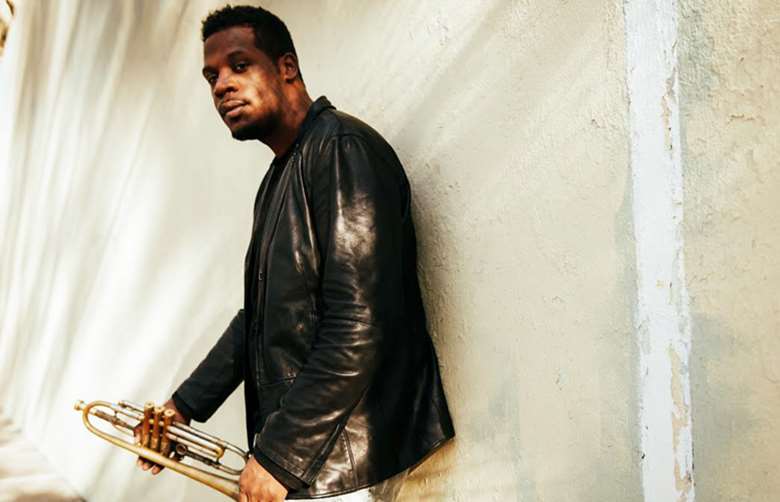Rising star trumpeter Keyon Harrold powerful and political at The Jazz Café
Tuesday, April 17, 2018
It seems like every time I pick up a great crossover album at the moment and there's a trumpet player on it that trumpet player turns out to be Keyon Harrold.

The Missouri-born New York City-based musician is best known for his work on the Miles Ahead soundtrack (he was the trumpet double for Don Cheadle's Miles Davis and his young rival, Junior). But his list of credits is humbling. In the past two decades, he's worked with Jay Z, Maxwell, D'Angelo, Billy Harper and Gregory Porter. And he pops up on a slew of recent recordings, including Common's Black America Again, Chris Dave's long-awaited Drumhedz release and Terrace Martin's Velvet Portraits.
But Harrold is fast becoming a star solo artist in his own right. I enjoyed his major label debut, The Mugician (a nickname and portmanteau coined by Cheadle himself), when it was released last year. Robert Glasper and brilliant vocalist Bilal both feature and there's some gorgeous orchestral writing on there – slicing strings and sonorous bass clarinets. Performed live though, by Harrold's New York trio plus keys player Ashley Henry, a star of the London new wave, it was something else entirely. I didn't realise Harrold's sound was that bold, that his jazz chops were that good or that he could stretch out that far. There's so much feeling in his playing, whether he's crafting mellow lines or hammering out ear-shredding pyrotechnics, you know he means every note.
The set began the way the album does, with Harrold soloing around a voicemail message from his Mum, Shirley, telling him to never give up on his dreams. As an emotionally repressed Brit, I usually roll my eyes at heart-on-sleeve stuff like that. But Harrold played with such passion, I could feel a lump rising in my throat. Though he considers himself a jazz musician at heart, Harrold describes his music as a "gumbo" of different styles. The album's title-track brought skanking reggae; a version of 'In A Sentimental Mood', featuring singer Andrea Pizziconi, sounded like Ellington remixed by Slum Village – all lopsided beats and lowriding basslines; Pizziconi and China Moses added soulful backing vocals to 'Wayfaring Traveler'; and the dreamy 'Stay This Way' became a thrashing rock anthem, with a blazing guitar solo from Nir Felder.
The band were on fire. Henry's playing was more assured and more varied than ever before, and later in the set bassist Burniss Travis opened up, decorating a heavy arrangement of The Beatles' 'She's Leaving Home' with thrumming, high-register phrases that sounded like flamenco guitar. He lived up to his nickname, 'Boom', on fusion burner 'Bubba Rides Again', hammering out a one-note bass groove – a chest-shaking low-frequency piledriver pounding out of the subs. When his time came, drummer Charles Haynes exploded the beat, then brutally and repeatedly stamped on his bass-drum pedal. I love it when drummers play like that: when you know they're not even thinking about complex cross rhythms or related time signatures, they're just smashing things at random. Sometimes the moment demands it.
But this was more than just a great gig. It had impact. It felt important. Harrold is highly political. He runs a music non-profit called Compositions For A Cause with Andrea Pizziconi, and she joined him on stage to sing 'Circus Show', an ode to the ludicrous, terrifying times we live in. The emotional climax was the ballad 'MB Lament', written for Michael Brown, a black teenager who was gunned down by police in Ferguson, two blocks from Harrold's father's home. It was dedicated to all victims of law enforcement "debacles", because "nobody deserves to be killed just for walking down the street". Its mellow, reflective bassline morphed into the head-jolting groove of 'When Will It Stop' and the band, plus guest altoist Soweto Kinch who stormed out of the wings and bit down hard on his reed, unleashed more righteous fire.
On the journey home, I couldn't stop thinking about that photograph taken during the Black Lives Matter protests in Baton Rouge in 2016. Perhaps you remember it. It shows a young black woman in a flowing dress calmly making a stand, alone in the middle of the road. Two police officers in riot gear are closing in on her. She's about to be arrested. But in the split second that the photograph was taken, it looks as if the officers are falling back, overawed. It's like there's a forcefield around her. She looks devastating and untouchable – majestic, even – a beacon of non-violent resistance, radiating grace and power. 'My Queen Is Ieshia Evans'.
In the biggest moments, when Harrold was pouring his heart out, singing the blues through his horn, preaching pride and determination, this performance felt the way that photograph feels. If that picture were a scene in a film, Harrold's music would be playing.
– Thomas Rees